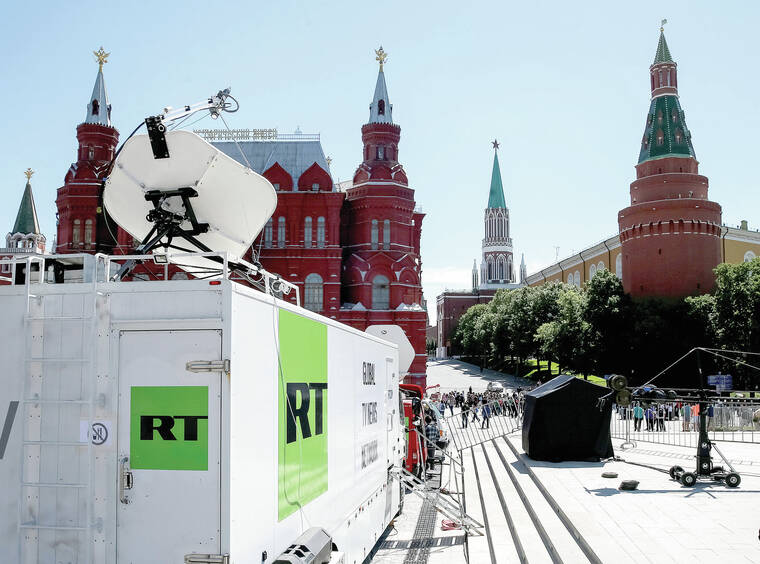WASHINGTON — Russia-backed entities pursued a sprawling, yearslong operation to meddle in the 2024 U.S. presidential election and broadly boost the Kremlin’s interests, the Biden administration alleged in announcing steps to disrupt the scheme.
The U.S. Justice Department on Wednesday unsealed charges against two Russian nationals accused of laundering nearly $10 million to pay for a secret foreign influence campaign and revealed the seizure of several dozen web domains they claimed were used to “covertly spread Russian government propaganda.”
The operation allegedly included efforts to “reduce international support for Ukraine, bolster pro-Russian policies and interests, and influence voters in the U.S. and foreign elections,” according to an FBI affidavit unsealed in Pennsylvania federal court.
The FBI cited internal planning documents from one of the entities saying it was in Russia’s interest to ensure that Donald Trump or another Republican candidate wins the White House in the Nov. 5 presidential contest. The translated versions of the documents included in court filings are redacted, but the references to “US Political Party A” and “Candidate A” match the Republican party and Trump.
“We have no tolerance for attempts by authoritarian regimes to exploit our democratic system of government,” Attorney General Merrick Garland said while announcing the charges and other court actions before an election threat task force meeting Wednesday.
A representative of the Russian Embassy and a spokesperson for Trump’s campaign did not respond to a request for comment.
As part of the crackdown, the Treasury Department announced new sanctions on Russian state-funded broadcaster RT and senior leaders — including editor-in-chief Margarita Simonyan — for trying to recruit “unwitting American influencers” as part of its “malign influence” campaign by using a front company. The sanctions are part of the broader US actions against RT’s parent company, Rossiya Segodnya media group, and four other subsidies.
It also targeted ANO Dialog, a nonprofit founded by the Moscow city government in 2019, that uses artificial intelligence as part of its disinformation effort against election campaigns and is linked to a Russian influence operation that creates so-called deep fakes.
“Today’s action underscores the US government’s ongoing efforts to hold state-sponsored actors accountable for activities that aim to deteriorate public trust in our institutions,” Treasury Secretary Janet Yellen said in a statement.
The U.S. is restricting visa issuance for people, as well as potentially their family members and close business associates, who engaged in the alleged covert influence operation, according to a senior State Department official. The U.S. is also designating six RT affiliates as foreign missions, meaning that they will need to notify the department of their employees working in the U.S. and all real property held by the entities. The department also announced a $10 million reward for information on potential foreign efforts to influence or interfere with the election.
A spokesperson for RT did not return a request for comment. RT dismissed the US allegations as “hackneyed cliches” on its Telegram channel.
“Three things in life are inevitable: death, taxes and ‘RT’s interference in American elections,’” RT said.
The Justice Department has been ramping up election security efforts in advance of the presidential contest to avoid the chaos and violence that erupted after the 2020 vote. Earlier this week, the department unveiled how national security officials will share information about foreign threats to the election with social media companies while protecting constitutional rights. U.S. intelligence agencies have warned that countries such as Russia and Iran are conducting nefarious activities to interfere with the U.S. election.
Federal investigators wrote in the unsealed Pennsylvania warrant affidavit that the influence campaign — referred to as “Doppelganger” — violated U.S. laws against money laundering and trafficking in counterfeit goods or services.
Since at least 2022, according to the FBI, Russian-controlled entities “cybersquatted” internet domains that led to fake websites that impersonated real media outlets, including Fox News and the Washington Post. The Russian entities sought to drive traffic to these fake domains by deploying influencers, paying for social media ads, and creating fake social media profiles pretending to be run by U.S. or other non-Russian citizens, US investigators said.
The propaganda effort was directed at least in part by Sergei Kiriyenko, who was described as serving as Russian President Vladimir Putin’s “domestic policy curator” when the US government imposed sanctions on Kiriyenko in March 2021, according to court papers.
Starting in the fall of 2023, U.S. investigators said that the Russian entities developed a scheme to interfere in the 2024 federal elections called “The Good Old U.S.A. Project.” The campaign was aimed at convincing American voters — especially in several swing states — to prioritize “domestic issues instead of wasting money” backing Ukraine in its war against Russia, according to court papers.
The alleged scheme also included using artificial intelligence tools to create pictures and videos to use in “negative advertisements about US politicians” and to register social media accounts that appeared to be news outlets such as CNN and the BBC.
According to the indictment unsealed in federal court in Manhattan against two Russian nationals, RT and its employees used a U.S.-based content creation company to post thousands of videos about immigration, inflation and other issues related to U.S. policy on social media platforms, including YouTube, Instagram, X and TikTok.
The Justice Department alleged the videos were part of an attempt to exploit divisions within US society and “weaken US opposition to core Government of Russia interests, such as its ongoing war in Ukraine.”




